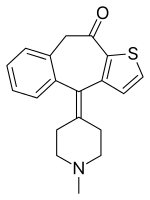Ketotifen
 | |
| Clinical data | |
|---|---|
| Trade names | Zaditor[1] |
| AHFS/Drugs.com | Micromedex Detailed Consumer Information |
| MedlinePlus | a604033 |
| Pregnancy category |
|
| Routes of administration | Oral (tablets), ophthalmic solution |
| ATC code | |
| Legal status | |
| Legal status |
|
| Pharmacokinetic data | |
| Bioavailability | 60% |
| Protein binding | 75% |
| Metabolism | Hepatic |
| Biological half-life | 12 hours |
| Identifiers | |
| |
| CAS Number | |
| PubChem CID | |
| IUPHAR/BPS | |
| DrugBank | |
| ChemSpider | |
| UNII | |
| KEGG | |
| ChEMBL | |
| ECHA InfoCard | 100.047.349 |
| Chemical and physical data | |
| Formula | C19H19NOS |
| Molar mass | 309.426 g/mol |
| 3D model (JSmol) | |
| |
| |
| (verify) | |
Ketotifen is a first-generation noncompetitive H1-antihistamine and mast cell stabilizer. It is most commonly sold as a salt with fumaric acid, ketotifen fumarate, and is available in two forms. In its ophthalmic form, it is used to treat allergic conjunctivitis.[2] In its oral form, it is used to prevent asthma attacks or Anaphylaxis, as well as various mast cell, allergic-type disorders.[3][4][5][6][7]
Uses
Ketotifen relieves and prevents eye itchiness and/or irritation associated with most seasonal allergies. It starts working within minutes after administering the drops. The drug has not been studied in children under three.[2] The mean elimination half life is 12 hours.[8] Besides its anti-histaminic activity, it is also a functional leukotriene antagonist and a phosphodiesterase inhibitor.
"[O]ral ketotifen has been used in patients with asthma, allergic rhinitis, allergic conjunctivitis, atopic dermatitis, chronic urticaria, cold-induced urticaria, cholinergic urticaria, exercise-induced urticaria, [systemic mast cell disease including mastocytosis, MCAS, allergic and nonallergic anaphylaxis, angioedema], and food allergy in Canada, Europe, and Mexico." Now available via prescription at US compounding pharmacies: "For adults and older children with asthma or allergic disease, the recommended dose of ketotifen is 1 mg twice daily." "FDA staff did recommend more extensive evaluations for management of urticaria."[5][6]
The drug may also help relieve the symptoms of irritable bowel syndrome.[9]
Side effects
Side effects include drowsiness, weight gain, dry mouth, irritability, and increased nosebleeds.[10]
Brands
Ketotifen is marketed under many brand names worldwide.[11]
See also
References
- ↑ http://www.webmd.com/drugs/2/drug-17484/zaditor-opht/details%5B%5D
- 1 2 Zaditor prescribing information Novartis
- ↑ Sokol, Kristin C.; Amar, Neil K.; Starkey, Jonathan; Grant, J. Andrew (2013). "Ketotifen in the management of chronic urticaria: Resurrection of an old drug". Annals of Allergy, Asthma & Immunology. 111 (6): 433–6. PMC 4309375
 . PMID 24267353. doi:10.1016/j.anai.2013.10.003.
. PMID 24267353. doi:10.1016/j.anai.2013.10.003. - ↑ Shawky, Rabah M.; Seifeldin, Neveen S. (2015). "The relation between antihistamine medication during early pregnancy & birth defects". Egyptian Journal of Medical Human Genetics. 16 (4): 287–90. doi:10.1016/j.ejmhg.2015.04.003.
- 1 2 Zuberbier, Torsten (2012). "A Summary of the New International EAACI/GA2LEN/EDF/ WAO Guidelines in Urticaria". World Allergy Organization Journal. 5 (1): S1–S5. doi:10.1186/1939-4551-5-S1-S1.
- 1 2 Zuberbier, T.; Asero, R.; Bindslev-Jensen, C.; Walter Canonica, G.; Church, M. K.; Giménez-Arnau, A. M.; Grattan, C. E. H.; Kapp, A.; Maurer, M.; Merk, H. F.; Rogala, B.; Saini, S.; Sánchez-Borges, M.; Schmid-Grendelmeier, P.; Schünemann, H.; Staubach, P.; Vena, G. A.; Wedi, B. (2009). "EAACI/GA²LEN/EDF/WAO guideline: Management of urticaria". Allergy. 64 (10): 1427–43. PMID 19772513. doi:10.1111/j.1398-9995.2009.02178.x.
- ↑ Li, Zhenhong; Celestin, Jocelyn (February 23, 2015). Ketotifen: A Role in the Treatment of Idiopathic Anaphylaxis. American Academy of Allergy, Asthma & Immunology Annual Meeting. Houston.
- ↑ Grahnén, A.; Lönnebo, A.; Beck, O.; Eckernäs, S-Å; Dahlström, B.; Lindström, B. (1992). "Pharmacokinetics of ketotiffn after oral administration to healthy male subjects". Biopharmaceutics & Drug Disposition. 13 (4): 255–62. PMID 1600111. doi:10.1002/bdd.2510130404.
- ↑ Klooker, T. K.; Braak, B.; Koopman, K. E.; Welting, O.; Wouters, M. M.; Van Der Heide, S.; Schemann, M.; Bischoff, S. C.; Van Den Wijngaard, R. M.; Boeckxstaens, G. E. (2010). "The mast cell stabiliser ketotifen decreases visceral hypersensitivity and improves intestinal symptoms in patients with irritable bowel syndrome". Gut. 59 (9): 1213–21. PMID 20650926. doi:10.1136/gut.2010.213108.
- ↑ http://www.mims.co.uk/drugs/allergic-disorders/allergic-rhinitis-urticaria-other-allergies/zaditen
- ↑ drugs.com International availability of ketofin Page accessed April 21, 2015